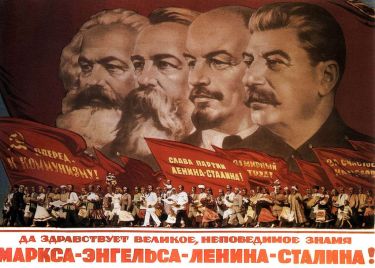No edit summary |
(Formatting and hyperlinks) Tags: Mobile edit Mobile web edit |
||
| Line 1: | Line 1: | ||
[[File:Heads of Communism.jpg|thumb|375x375px]] | [[File:Heads of Communism.jpg|thumb|375x375px]] | ||
'''Communism''' is a real movement, to achieve dignity for the working class, in a world of alienation. As Friedrich Engels said in his [https://www.marxists.org/archive/marx/works/1847/11/prin-com.htm Principals of Communism] "Communism is the doctrine of the conditions of the liberation of the proletariat.". It emerged out of the social question, which occured during the final stages of the process of [[Modernity]], in the form of 19th century Anglo Saxon capitalism. | '''Communism''' is a real movement, to achieve dignity for the working class, in a world of [[alienation]]. As [[Friedrich Engels]] said in his [https://www.marxists.org/archive/marx/works/1847/11/prin-com.htm Principals of Communism] "Communism is the doctrine of the conditions of the liberation of the [[proletariat]].". It emerged out of the social question, which occured during the final stages of the process of [[Modernity]], in the form of 19th century Anglo Saxon capitalism. | ||
Communism is similar to [[Socialism]], but the difference between Communism and Socialism, is that Communism is the movement, whole Socialism is the [[mode of production]]. | |||
Modernity, particularly in its later stages, comes in the form of the mode of production that is [[Capitalism]]. The human being, the worker, is being atomized, just another cog in the machine, all of the cultural, social, traditional, aspects of human beings was being abstracted into nothing, and humanity was born into a world that didn't make any sense. Society was not ruled, based on cultural, social, traditional characteristics of each society, which had been the case for 1000's of years. Instead society as a whole was being ruled by the [[exchange-value|dollar]], the need to make [[profit]] triumphed all others at this time. Communism meant a mass movement that would return to the traditions, cultural, and social, aspects of humanity, without compromising the progress made by modernity in other words, [[production]] would no longer be incompatible with the majority of people's lives. This movement would lead to some kind of mode of production in which we would work for humanity, Socialism. | |||
However many of these Communist movements at this time, had no such social science, it was based on [[idealism]], "If I want something It will happen" the idealist says, despite the fact that real, material, or concrete realities would probably not be able to fit what you "want". Many of these Communist movements believe that we can somehow go from point A to point B, easily. [[Karl Marx]] and [[Friedrich Engels]], disagreed, they believed that we cannot simply go from point A to point B, that is an abstraction, we cannot go from one mode of production to another, simply based on [[will]]. They believed that there were (and are) real, material forces and contradictions, within this world that allow Capitalism to exist the way it does, that leads to it's demise, and to the awakening of a new mode of productions, not ideas, or metaphysics. The science in question, used by Marx and Engels, that allowed them to make such a claim was called [[Dialectical Materialism]]. This science, combined with communist or socialist politics is called [[Scientific Socialism]]. | |||
[[Category:Ideologies]] | [[Category:Ideologies]] | ||
[[Category:Stubs]] | [[Category:Stubs]] | ||
Revision as of 18:13, 26 December 2024
Communism is a real movement, to achieve dignity for the working class, in a world of alienation. As Friedrich Engels said in his Principals of Communism "Communism is the doctrine of the conditions of the liberation of the proletariat.". It emerged out of the social question, which occured during the final stages of the process of Modernity, in the form of 19th century Anglo Saxon capitalism.
Communism is similar to Socialism, but the difference between Communism and Socialism, is that Communism is the movement, whole Socialism is the mode of production.
Modernity, particularly in its later stages, comes in the form of the mode of production that is Capitalism. The human being, the worker, is being atomized, just another cog in the machine, all of the cultural, social, traditional, aspects of human beings was being abstracted into nothing, and humanity was born into a world that didn't make any sense. Society was not ruled, based on cultural, social, traditional characteristics of each society, which had been the case for 1000's of years. Instead society as a whole was being ruled by the dollar, the need to make profit triumphed all others at this time. Communism meant a mass movement that would return to the traditions, cultural, and social, aspects of humanity, without compromising the progress made by modernity in other words, production would no longer be incompatible with the majority of people's lives. This movement would lead to some kind of mode of production in which we would work for humanity, Socialism.
However many of these Communist movements at this time, had no such social science, it was based on idealism, "If I want something It will happen" the idealist says, despite the fact that real, material, or concrete realities would probably not be able to fit what you "want". Many of these Communist movements believe that we can somehow go from point A to point B, easily. Karl Marx and Friedrich Engels, disagreed, they believed that we cannot simply go from point A to point B, that is an abstraction, we cannot go from one mode of production to another, simply based on will. They believed that there were (and are) real, material forces and contradictions, within this world that allow Capitalism to exist the way it does, that leads to it's demise, and to the awakening of a new mode of productions, not ideas, or metaphysics. The science in question, used by Marx and Engels, that allowed them to make such a claim was called Dialectical Materialism. This science, combined with communist or socialist politics is called Scientific Socialism.
